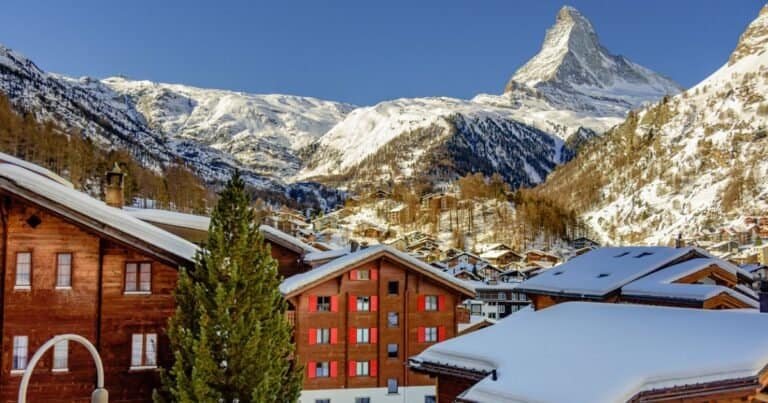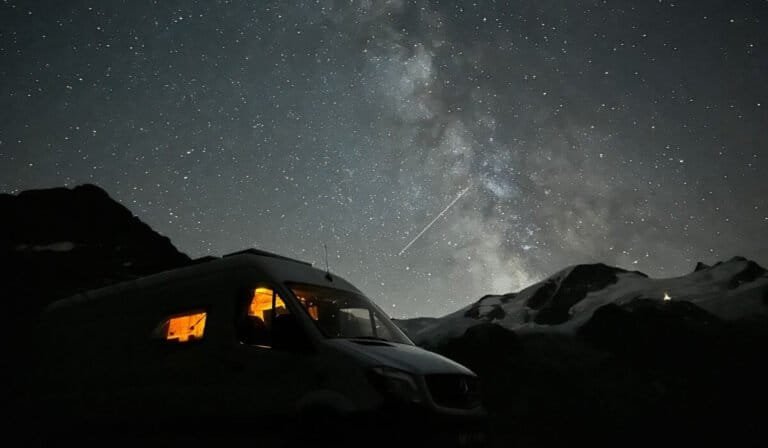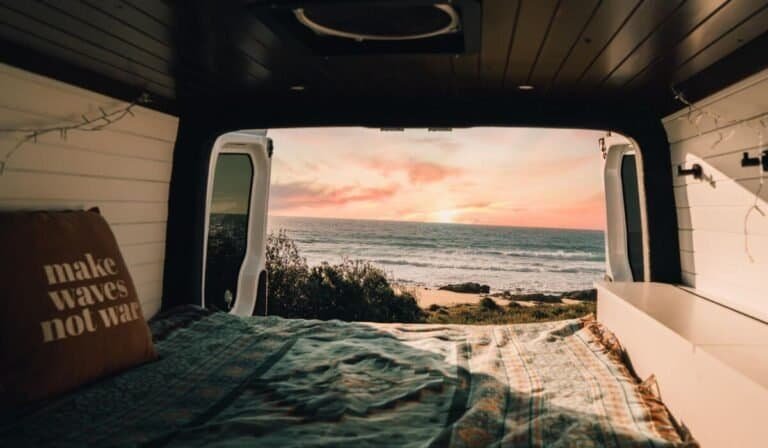Vanlife is a lifestyle movement that has gained popularity in recent years, with people converting vans into mobile homes and travelling the roads to explore new places, enjoy the freedom of the open road, and embrace minimalism. The term “vanlife” refers to living, travelling, and sometimes working from a converted van or motorhome. But is vanlife legal in Scotland?
Need vanlife tips? Here’s our complete guide on living in a van!
Is Vanlife Legal In Scotland?
In Scotland, vanlife is generally legal, but there are some rules and regulations that you should be aware of before embarking on your adventure. These regulations pertain to parking, camping, and overnight stays, among other things.
Can I Sleep In My Van In Scotland?
In Scotland, it is legal to park your van on public land for the purpose of sleeping overnight, provided that you do not cause an obstruction or inconvenience to others.
However, there are restrictions in place when it comes to parking in certain areas such as city centres, residential neighbourhoods, and designated parking zones. It is essential to check local signage and adhere to any parking restrictions in place.
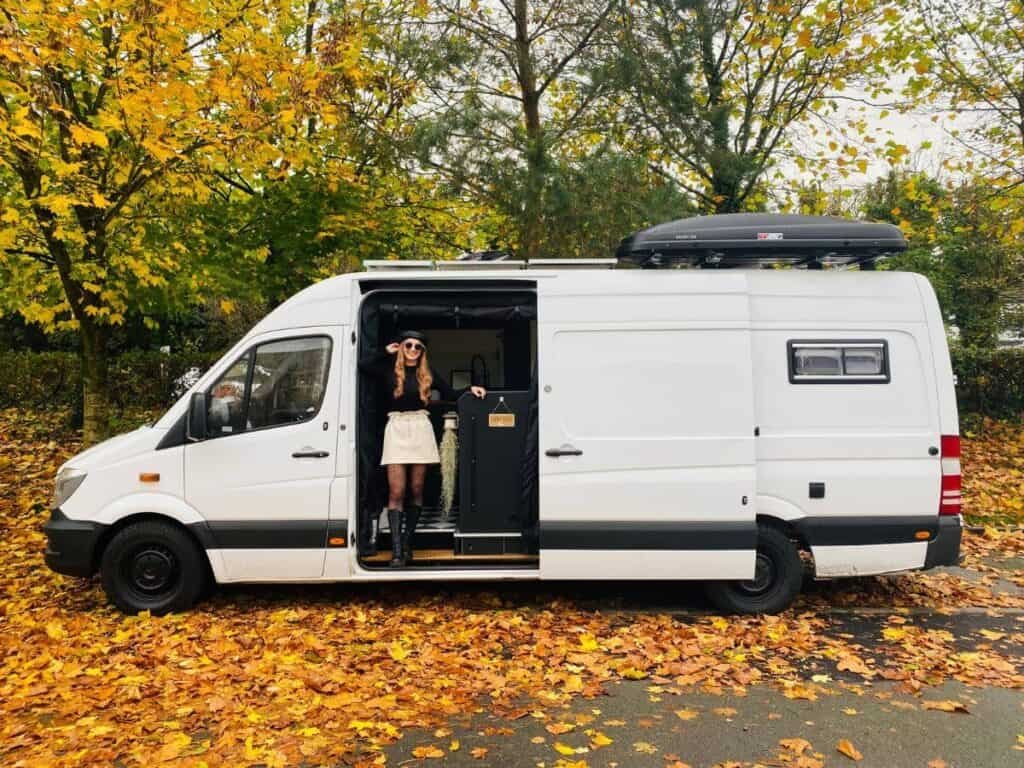
Can You Park Overnight Anywhere In Scotland?
In Scotland, legally you can typically park overnight on public land, provided that you don’t create any obstructions or disturbances for others. Nonetheless, local restrictions may apply, making it essential to look for signs and follow any area-specific regulations.
Parking or wild camping on private land is not permitted without the owner’s consent. The Scottish Outdoor Access also known as The Right To Roam does not extend to vanlife or motorised vehicles of any kind.
Designated Overnight Parking Areas
To ensure a hassle-free experience, consider staying at designated campsites, caravan parks, or parking areas that permit overnight stays for vehicles. These locations often provide facilities such as toilets, showers, laundry and waste disposal, making your stay more comfortable. Some popular options include:
The Camping and Caravanning Club (www.campingandcaravanningclub.co.uk) – Offers a network of campsites across Scotland with facilities for motorhomes and campervans.
Brit Stops (www.britstops.com) – A scheme that allows motorhome users to park overnight at selected pubs, farms, and vineyards in exchange for patronising their businesses.
Park4Night is a handy app filled with user-generated content on great free parkups and their nearby facilities.
Popular Tourist Locations and Associated Parking Rules
Edinburgh
Parking in the city centre can be challenging due to restrictions and limited spaces. Consider using park-and-ride facilities on the outskirts of the city and exploring the city centre by public transport. Overnight parking within the city is generally discouraged, so it’s best to find a campsite or caravan park nearby.
Loch Lomond & The Trossachs National Park
Wild camping is allowed in most parts of the park, but motorised vehicles, including vans and motorhomes, must use designated campsites or parking areas. Overnight parking is not permitted in some car parks, so check the signage before settling in for the night.
Isle of Skye
Overnight parking is permitted in some areas, but it’s essential to respect local rules and guidelines. The Isle of Skye has seen a significant increase in tourism, leading to overcrowding and environmental concerns. Designated campsites are recommended for overnight stays.
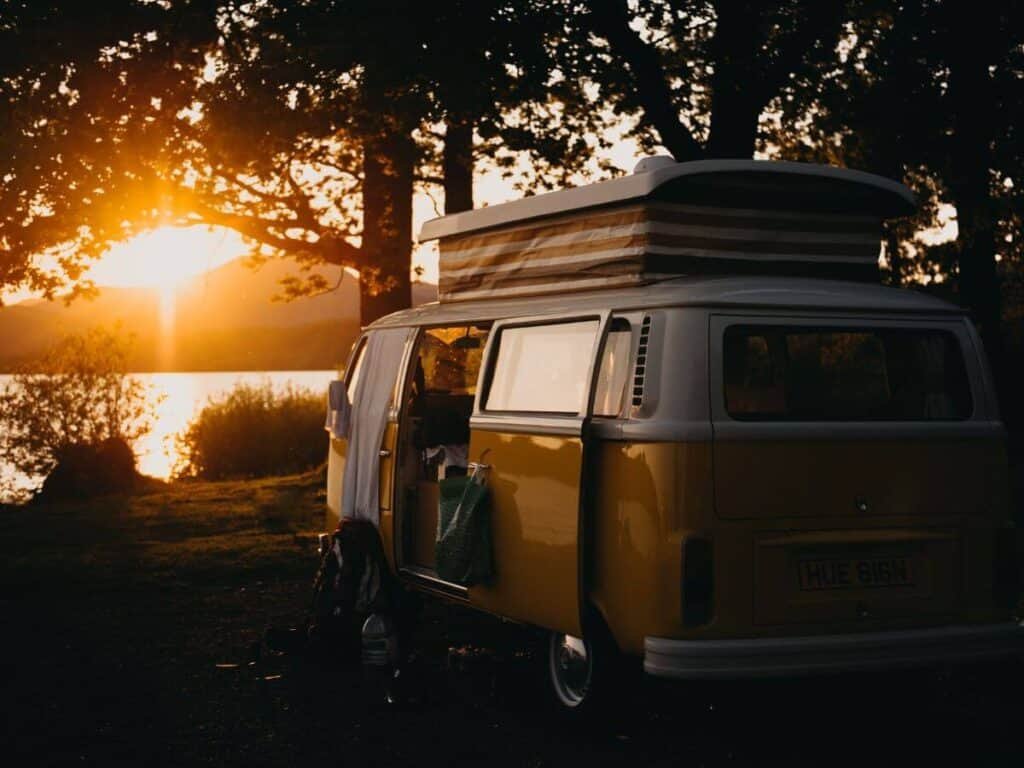
Can You Free Camp Anywhere In Scotland?
When it comes to overnight stays, Scotland operates under the Scottish Outdoor Access Code, which allows for responsible wild camping. This means that you can camp on most unenclosed land, provided that you follow the “leave no trace” principle.
However, this does not apply to motorised vehicles, including vans and motorhomes. Therefore, you will need to find designated campsites or parking areas that permit overnight stays for vehicles.
While wild camping is allowed in Scotland, there are some areas where it is either restricted or requires a permit. For example, Loch Lomond & The Trossachs National Park has introduced bylaws restricting camping between March and September, and a permit is required if you wish to camp within designated areas during these months.
Always research specific locations before you travel to ensure you comply with local regulations.
Relevant Authorities and Information Sources
The relevant authorities governing vanlife in Scotland include local councils, national park authorities, and landowners. Each of these authorities may have specific rules and regulations in place that you must adhere to.
To find the most up-to-date and accurate information on vanlife in Scotland, consider consulting the following sources:
- The Scottish Outdoor Access Code website (www.outdooraccess-scotland.scot)
- National park authority websites, such as Loch Lomond & The Trossachs National Park (www.lochlomond-trossachs.org) or Cairngorms National Park (www.cairngorms.co.uk)
- Local council websites for information on parking restrictions and regulations
Can You Travel Around Scotland In A Van?
Yes, you can travel around Scotland in a van. While some of the roads in the North may be tight, single tracks with passing places, you’ll see plenty of large campervans bumbling their way around routes like the NC500.
Many people choose to explore the country’s stunning landscapes, historic sites, and picturesque towns by converting vans into mobile homes or renting campervans and motorhomes. This mode of travel offers flexibility, allowing you to venture off the beaten path and discover hidden gems at your own pace.
Best Times To Travel
To avoid the busiest tourist months, consider visiting Scotland between late April and early June, or September and October. During these periods, you’ll likely encounter fewer midges, milder temperatures, fewer crowds and more availability at campsites and attractions.
While this time of year might seem risky with the temperamental Scottish weather, I can assure you the weather can be temperamental any month of the year. Heavy, consistent downpours are just as likely in the summer months.
We spent September and October travelling around Scotland in recent years and were extremely lucky to be met with sunshine and dry days. It really can be luck of the draw.
If you’re thinking of taking on a winter wonderland journey to Scotland check out our article on the Scottish winter season – Does It Snow In Scotland | Your Complete Guide or our Winter Vanlife Survival Guide.

Renting vs Buying A Van
Renting: Renting a van is a convenient option if you’re planning a shorter trip or don’t want the responsibility of owning a vehicle. You can choose from a variety of fully-equipped campervans and motorhomes from rental companies in Scotland. However, renting can be more expensive in the long run, especially during peak seasons.
Buying: If you plan on travelling for an extended period or embarking on multiple road trips, purchasing a van might be a better investment. Owning a van allows you to customize it according to your preferences and offers flexibility for future adventures. Keep in mind that buying a van also comes with additional responsibilities, such as insurance, maintenance, and storage when not in use.
Suggested Routes and Must-See Destinations
North Coast 500: This iconic 500-mile route starts and ends in Inverness, taking you through the stunning landscapes of the Scottish Highlands. Must-see stops include Loch Ness, Applecross Peninsular, and Duncansby Head.
South West Coastal 300: Explore the picturesque coastline and rolling hills of Southern Scotland on this 300-mile loop. Highlights include the Galloway Forest Park, Mull of Galloway, and Culzean Castle.
Argyll Coastal Route: This 129-mile route showcases the natural beauty of Argyll and Bute, with stops at Loch Lomond, Inveraray Castle, and the Isle of Mull.
Tips and Advice For Vanlife Scotland
- Familiarise yourself with driving on the left side of the road and roundabouts.
- Be prepared for narrow roads, especially in rural areas, and be cautious of passing vehicles.
- Follow posted speed limits and adjust your speed based on road conditions and traffic.
- Plan your route in advance, including fuel stops and potential overnight parking locations.
- Always check for signage and adhere to local parking restrictions.
- If in doubt, ask locals or contact local authorities for guidance on overnight parking.
- Avoid parking in residential areas or near popular tourist spots where parking may be restricted.
- Be considerate of the environment and local communities by following the “leave no trace” principle.
💡Top Tip – Fuel stations can be few and far between in rural parts of Scotland, make sure to pre-plan your fuel stops!
For the best Vanlife jobs, check out our in-depth guide here!
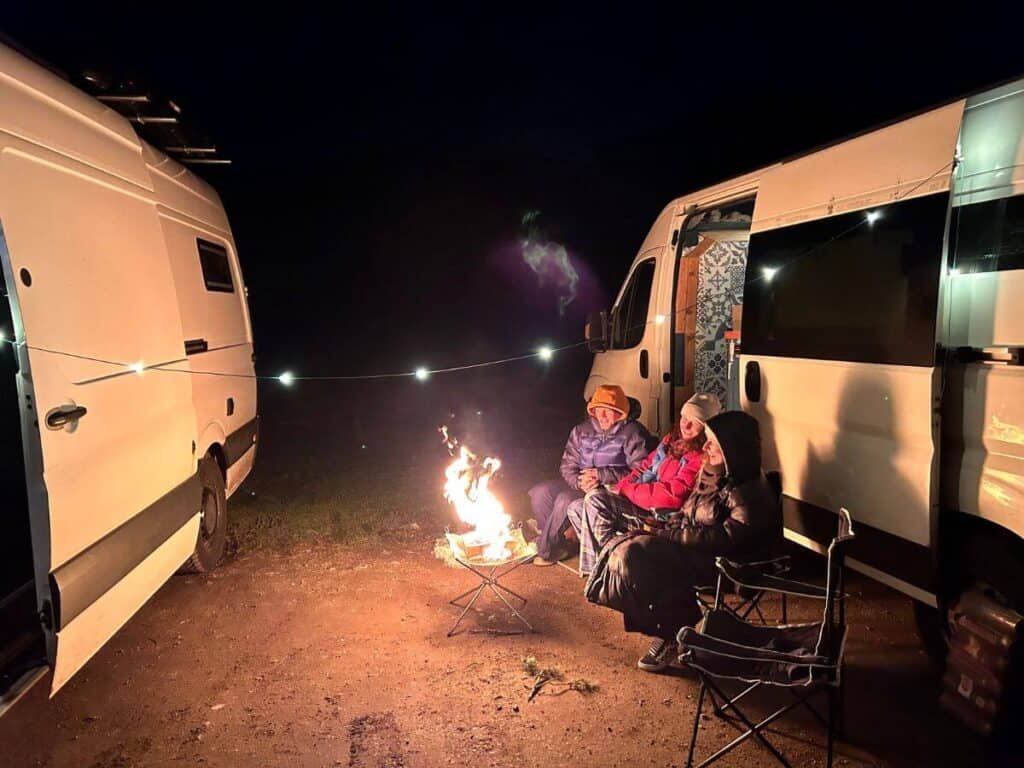
What Are The Campervan Rules In Scotland?
By adhering to campervan rules and regulations in Scotland, you’ll contribute to a positive experience for yourself, other travellers, and local communities. As previously stated sleeping overnight in a campervan is allowed in designated parking spots, as well as public roads with no parking restrictions.
The Scottish Outdoor Access Code, also known as The Right To Roam does not extend to campervans or any type of motorised vehicle. This is for responsible wild camping only.
Service areas, often found along major roads and highways, provide essential amenities such as fuel, restrooms, and food. Some service areas may also offer dedicated spaces for campervans to park overnight, but this varies by location. Always confirm the availability of overnight parking before settling in for the night.
Campervan Waste Disposal
Dispose of waste responsibly by using designated waste disposal facilities at campsites, caravan parks, or other approved locations. This includes emptying chemical toilets and disposing of grey water. Adhering to proper waste disposal practices helps protect Scotland’s environment and ensures a pleasant experience for all visitors.
Speed Limits In Scotland
In Scotland, speed limits vary depending on the type of road and the size of your campervan. Standard limits are:
- Built-up areas: 30 mph (48 km/h)
- Single carriageways: 60 mph (96 km/h) for campervans under 3.05 tons, 50 mph (80 km/h) for those over 3.05 tons
- Dual carriageways and motorways: 70 mph (112 km/h) for campervans under 3.05 tons, 60 mph (96 km/h) for those over 3.05 tons
Always observe posted speed limits and adjust your speed according to road conditions and traffic.
Licenses and Documentation
To operate a campervan in Scotland, you’ll need a valid driver’s license that permits you to drive the specific vehicle category. Most standard licenses allow you to drive campervans up to 3.5 tons but check your license details to confirm.
International visitors may require an International Driving Permit (IDP) alongside their home country’s license. Additionally, ensure that your campervan is insured and has a valid road tax disc.
Responsible and Respected Visitor Guidelines
Environmental Sustainability: Follow the “leave no trace” principle, dispose of waste responsibly, and avoid damaging natural habitats.
Cultural Awareness: Respect local customs, traditions, and heritage sites, and take time to learn about Scotland’s rich history and culture.
Local Community Privacy: Be considerate of residents by avoiding parking in residential areas, keeping noise levels low, and respecting people’s privacy.

Where Can I Hire A Campervan In Scotland?
There are so many campervan hire companies in Scotland, but how do you choose? Here are a few options for your next Scottish adventure:
Quality Campervan Hire
Open Road Scotland is a reliable campervan hire company with a diverse fleet of vehicles and a commitment to excellent customer service. Consider them as a solid option for your Scottish road trip adventure.
Campervan Types: Open Road Scotland offers a variety of campervans and motorhomes to suit different needs and preferences. Their fleet includes compact 2-berth campervans, mid-sized 4-berth campervans, and larger 6-berth motorhomes. This variety ensures that you can find the right vehicle for your group size and requirements.
Location: The company’s primary depot is conveniently located in Central Scotland near Glasgow International Airport, providing easy access for travellers arriving by air.
Price Range: Prices vary depending on the chosen vehicle and season. Rates typically start from around £100 per day for smaller campervans and go up to £200 per day for larger motorhomes. It’s recommended to check their website (www.openroadscotland.com) for specific pricing and availability.
Unique Features: Open Road Scotland’s vehicles come well-equipped with modern amenities such as heating systems, fully-equipped kitchens, and comfortable sleeping arrangements. Some motorhomes even include onboard bathrooms. The company also offers extras like bedding packs, outdoor furniture, and GPS navigation to enhance your road trip experience.
Customer Service: Open Road Scotland is known for its exceptional customer service, with a dedicated team that provides personalized support throughout the rental process. They offer comprehensive pre-hire advice and are available to answer any questions or concerns during your trip.
Affordable Campervan Hire
Spaceships Rentals is a well-regarded motorhome and campervan hire company known for its range of high-quality vehicles at affordable prices. Their Scotland depot near Edinburgh Airport makes them a convenient option for your Scottish road trip adventure.
Campervan Types: Spaceships Rentals offers a variety of campervans and motorhomes to suit different needs and preferences. Their fleet includes compact campervans, larger motorhomes, and 4×4 campers. This selection ensures that you can find the right vehicle for your group size and requirements.
Scotland Depot: Spaceships Rentals has a depot conveniently located near Edinburgh Airport. This location provides easy access for travellers arriving by air and serves as an excellent starting point for exploring the beautiful Scottish landscapes.
Price Range: Prices for Spaceships Rentals campervans and motorhomes vary depending on the chosen vehicle and season. Rates typically start from around £50 per day for smaller campervans and go up to £100+ per day for larger motorhomes. It’s recommended to check their website (www.spaceshipsrentals.co.uk) for specific pricing and availability.
Unique Features: Spaceships Rentals’ vehicles are known for their fuel efficiency and easy manoeuvrability. They come equipped with essential amenities like comfortable sleeping arrangements, a fridge, cooking facilities, and ample storage space. The company also offers extras such as bedding packs, outdoor furniture, and GPS navigation to enhance your road trip experience.
Customer Service: Spaceships Rentals is committed to providing excellent customer service throughout the rental process. They offer comprehensive pre-hire advice and are available to answer any questions during your trip.
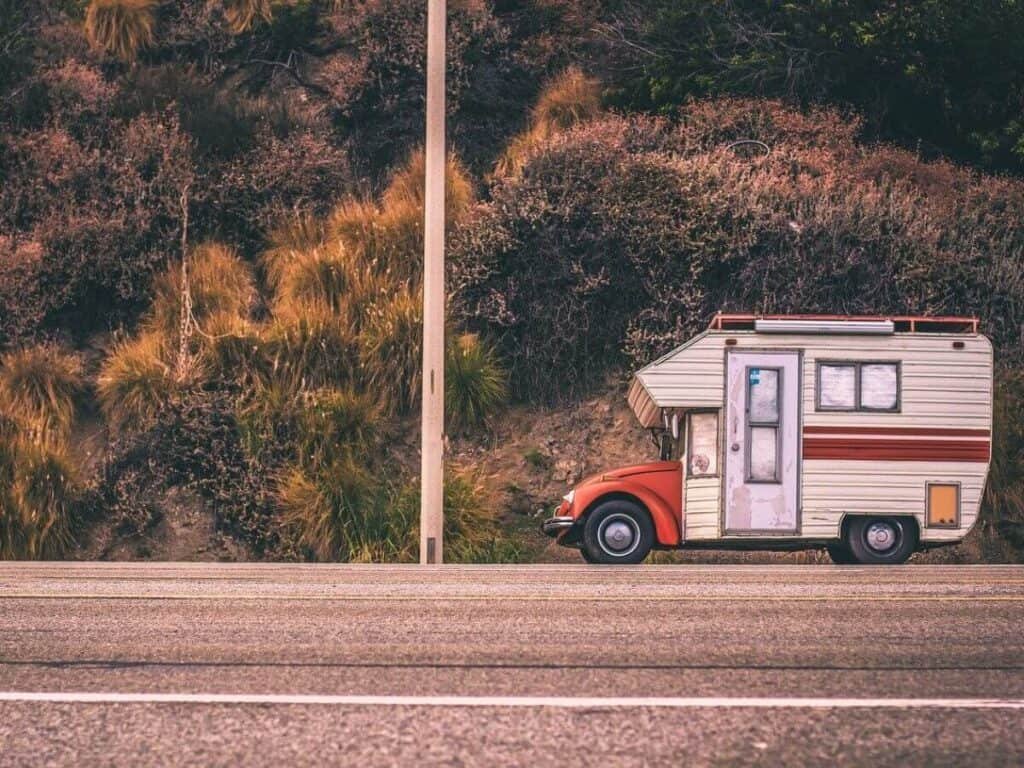
Luxury Campervan Hire
Zoom Motorhome Hire offers luxury campervans and motorhomes for Scottish road trips. With a wide range of vehicles to suit a solo traveller or a group.
Campervan Types: Zoom Motorhome Hire campervans and motorhomes come equipped with a range of features, including kitchen areas, bathrooms, entertainment systems, air conditioning and much more. This ensures that your rental is comfortable and enjoyable for the duration of your trip.
Location: Zoom Motorhome Hire is situated in Peebles around 1 hour south of Edinburgh. This is a convenient location for those driving up from further south in the UK. They also offer airport transfers (for an additional charge) for those arriving at Edinburgh Airport.
Price Range: Prices for Zoom Motorhome Hire campervans and motorhomes vary depending on the chosen vehicle and season. Rates typically start from around £125 per day for smaller campervans and go up to £195+ per day for larger motorhomes. It is recommended to check their website (www.zoommotorhomehire.co.uk) for specific pricing and availability.
Unique Features: Zoom Motorhome Hire vehicles are replaced every 18 months, meaning that no matter when you hire you will be driving a relatively new addition to their fleet. They come equipped with everything you need, stating that the only thing you need to pack is your clothes.
Customer Service: Zoom Motorhome Hire is dedicated to delivering exceptional customer service at every stage of the rental process. They provide extensive guidance before you rent and remain accessible to address any inquiries or issues you may encounter during your journey.
💡Top Tip – Book your campervan hire well in advance, vanlife is becoming increasingly popular!
The Wrap-Up | Is Vanlife Legal In Scotland?
So now we come to the wrap-up of is vanlife legal in Scotland. Vanlife is legal in Scotland, but there are various rules, regulations, and limitations that you should be aware of. It is vital to research your intended destinations, seek out designated campsites or parking areas for overnight stays, and respect local rules and guidelines.
By doing so, you can enjoy the freedom and adventure of vanlife while ensuring that you remain within the bounds of the law and not adding to the occasionally negative vanlife reputation.
